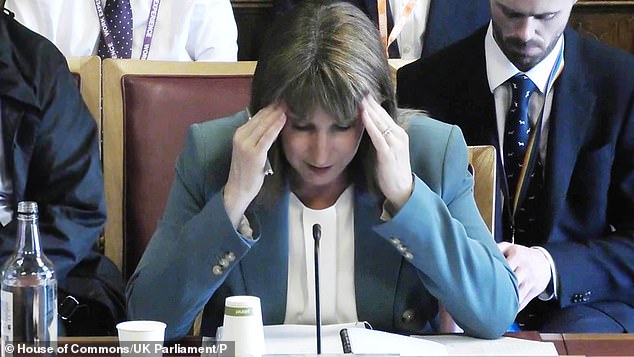[ad_1]
Britain’s private sector employers have been cutting jobs for 11 months in a row in the latest evidence of the damaging impact of Labour’s £25billion employer national insurance raid.
A closely-watched business survey by financial firm S&P Global showed job numbers were being reduced ‘at an aggressive rate’ in August.
‘Employment was again a weak spot as total workforce numbers decreased for the 11th month running and at a marked pace,’ the report said.
Separate data showed the number of new job postings fell in July after firms ‘took a kicking’ from last autumn’s Budget.
Businesses are still counting the cost of the rate of employer National Insurance (NI) rising from 13.8p per cent to 15 per cent and the cut in salary threshold for paying it from £9,100 to £5,000.
The move has sharply raised the cost of hiring staff and particularly damaged sectors such as retail and hospitality that are more reliant on lower-paid and part-time workers.

Under fire: Chancellor Rachel Reeves. A closely-watched business survey by financial firm S&P Global showed job numbers were being reduced ‘at an aggressive rate’ in August
It has been largely blamed for the sharp rise in unemployment since the general election, with more than 200,000 people joining the dole queue.
S&P’s findings were revealed as part of a wider purchasing managers’ index (PMI) survey of the private sector which showed business activity growing at the fastest pace in a year.
The findings will be welcomed by Rachel Reeves as she hopes for a turnaround after a growth slowdown in the second quarter. But they showed a contrast between accelerating growth in the services sector, which ranges from bars and hotels to accountants and solicitors, and contraction for manufacturers battered by tariff uncertainty.
The report also outlined the continuing pain being caused by the Chancellor’s NI hike.
It resulted in ‘another robust rise in prices charged by private sector firms’ this month – with inflation at an 18-month high.
‘Payroll numbers… continue to be cut at an aggressive rate by historical standards as firms cite weak order books and concerns over rising staff costs due to the policies announced in the autumn Budget,’ said Chris Williamson, the chief business economist at S&P Global.
Separately, the Recruitment and Employment Confederation, said a ‘summer slowdown’ had hit new job postings which fell 9.2 per cent last month compared to June, to 652,733.
Chief executive Neil Carberry said: ‘Business optimism took a kicking after last autumn’s Budget, with spring tax rises in particular weighing on employers thinking.
‘The fear of further costs, worries about the impact of the Employment Rights Bill and new tax rules are all on employers’ minds.
‘If ministers want growth, they must deliver stability and backing for businesses.’
On a brighter note, a monthly consumer confidence reading published by market research firm GfK ticked higher following this month’s Bank of England interest rate cut.
Neil Bellamy, consumer insights director at GfK, said: ‘The improved sentiment on personal finances is welcome, but there are many clouds on the horizon in the form of inflation and rising unemployment.
‘There’s no shortage of speculation, too, about what the autumn Budget will bring in terms of tax rises.’
DIY INVESTING PLATFORMS

AJ Bell

AJ Bell
Easy investing and ready-made portfolios

Hargreaves Lansdown

Hargreaves Lansdown
Free fund dealing and investment ideas

interactive investor

interactive investor
Flat-fee investing from £4.99 per month

InvestEngine

InvestEngine
Account and trading fee-free ETF investing
Trading 212
Trading 212
Free share dealing and no account fee
Affiliate links: If you take out a product This is Money may earn a commission. These deals are chosen by our editorial team, as we think they are worth highlighting. This does not affect our editorial independence.
[ad_2]
This article was originally published by a www.dailymail.co.uk . Read the Original article here. .

